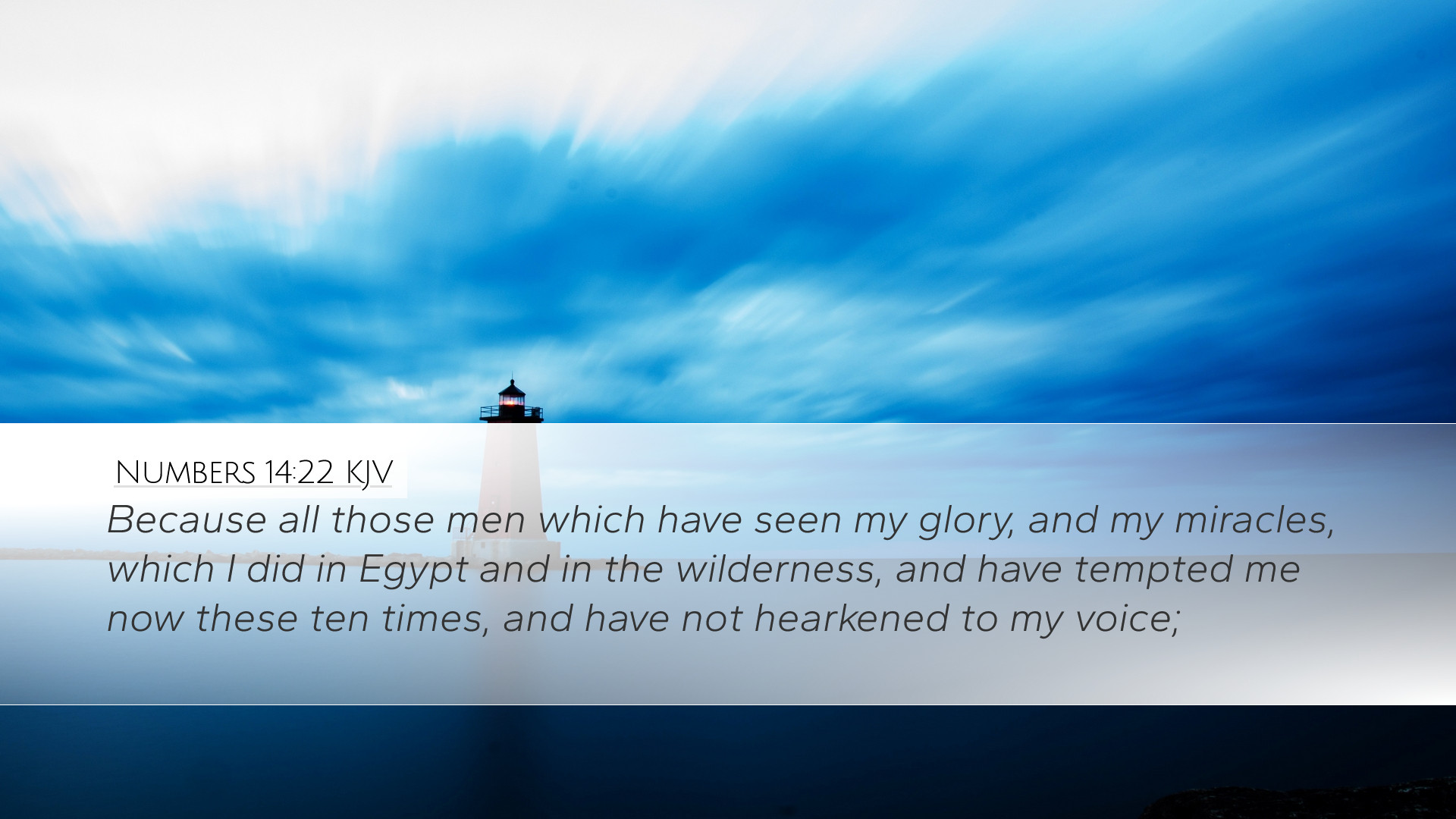Commentary on Numbers 14:22
Bible Verse: "Because all those men which have seen my glory, and my miracles which I did in Egypt and in the wilderness, and have tempted me now these ten times, and have not hearkened to my voice;" (Numbers 14:22, KJV)
Introduction
Numbers 14:22 serves as a pivotal verse illustrating God’s response to Israel’s rebellion and lack of faith. This verse encapsulates a significant moment where divine judgment is pronounced upon a generation that witnessed God’s manifestation of power yet chose to resist His commands. Understanding this verse involves exploring the context of Israel's journey, the implications of their unbelief, and the nature of God’s sovereignty and justice.
Contextual Analysis
The backdrop to this verse lies within the narrative of Israel’s wilderness wanderings following their Exodus from Egypt. Despite witnessing miracles, including plagues in Egypt and the parting of the Red Sea, the Israelites frequently expressed doubt and fear. Their rebellion reaches a climax as they stand at the threshold of the Promised Land, hesitating due to fear of the inhabitants. This moment prompted God’s declaration of judgment, as seen in Numbers 14:22.
Rebellion and Unbelief
The phrase "have tempted me now these ten times" indicates a pattern of rebellion. Matthew Henry comments on the significance of “ten times,” suggesting a figurative expression of complete and utter rebellion against God’s faithfulness. The repeated acts of rebellion not only provoked God’s anger but also revealed the deep-seated unbelief of the Israelites despite their encounters with His glory.
Theological Implications
This verse raises several theological considerations regarding human free will, divine sovereignty, and the nature of God’s judgments. Albert Barnes notes that the Israelites had multiple opportunities to trust in God, yet they chose to focus on their fears rather than His promises. This illustrates the tension between human responsibility and divine providence in the unfolding of Israel's history.
Divine Glory and Miracles
God’s mention of His "glory" and "miracles" serves to remind Israel of His steadfastness and power. Adam Clarke emphasizes this point, noting that God revealed Himself through acts of tremendous power in Egypt and throughout the wilderness. The testimony of God’s provision and protection was evident; however, the people’s consistent doubts diminished their perception of His greatness.
Testimony of God's Faithfulness
- Miracles in Egypt: The plagues demonstrate God's sovereignty over nature and systems of power.
- Parting of the Red Sea: A visible manifestation of deliverance that should strengthen faith.
- Provision of Manna: A continuous reminder of God's sustenance during their journey.
God's Response to Rebellion
God’s declaration encapsulates His righteous judgment as a response to the persistent rebellion of Israel. He articulates the consequences of their unbelief – a delayed entrance into the Promised Land for that generation. Matthew Henry points out that God’s patience has limits. While He is merciful and forgiving, there come moments when judgment is necessary to uphold justice and holiness.
Consequences of Unbelief
The consequences outlined in Numbers 14 emphasize that unbelief has severe implications. The Israelites are to wander in the wilderness until the faithless generation passes away, marking a somber reality – unbelief leads to lost opportunities and blessings.
Application for Today
For modern readers, Numbers 14:22 carries significant lessons. The repeated failures of Israel invite reflection on the importance of faith and trust in God's promises amidst challenges. Pastors and theologians can draw from this narrative to emphasize the call to live by faith, not by sight, a theme echoed throughout Scripture.
Encouragement for Faithfulness
This commentary invites an introspective assessment of personal faith journeys and collective church experiences. The narrative of Israel reminds believers to recall God’s past faithfulness, thus cultivating a heart of trust even when faced with uncertainties.
- Remember God's deeds: Remind congregations of God’s previous miracles in their lives and in Scripture.
- Encourage unity in faith: Foster an environment where the community supports one another in faith.
- Seek understanding of God’s character: As God's glory is revealed, believers are called to grow in their knowledge of Him.
Conclusion
Numbers 14:22 serves as a sobering reminder of the consequences of unbelief and the faithfulness of God. By reflecting on the failures of Israel, believers are prompted to cultivate a heart that responds to God with trust and obedience, recognizing His glorious presence and the reality of His sovereign hand in their lives. As they navigate their spiritual journeys, this passage challenges them to embrace faith, learn from past mistakes, and anticipate God’s future provisions and promises.


